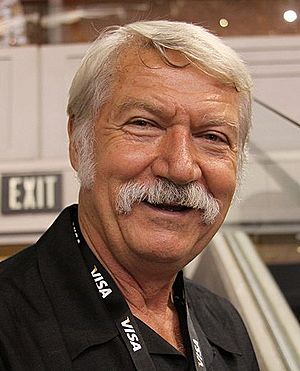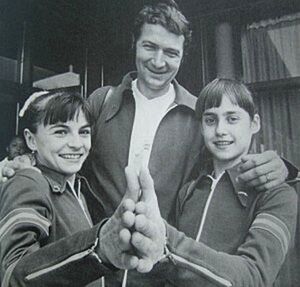Béla Károlyi facts for kids
Béla Károlyi (born September 13, 1942 – died November 15, 2024) was a famous gymnastics coach. He was born in Hungary, lived in Romania, and later became an American citizen. Early in his career, he helped create a special training system for gymnasts in Romania.
One of his first star students was Nadia Comăneci. She was the first gymnast in the Olympic Games to ever score a perfect score. Béla Károlyi and his wife, Márta Károlyi, moved to the United States in 1981. They helped change how gymnastics was coached in the U.S. and led American gymnasts to win many international awards.
Károlyi coached many amazing gymnasts. These included Olympic champions, world champions, and national champions. Some of his well-known students were Nadia Comăneci, Mary Lou Retton, and Kerri Strug. He was added to the International Gymnastics Hall of Fame in 1997. Béla and Márta Károlyi were also inducted into the US Gymnastics Hall of Fame in 2000.
Contents
Early Coaching Days
Béla Károlyi was born in Kolozsvár, Hungary (now called Cluj-Napoca in Romania). He was a talented athlete himself. He became a national junior boxing champion. He was also part of Romania's hammer throwing team. He went to the Romania College of Physical Education. There, he started studying and practicing gymnastics.
In his last year of college, Károlyi coached a women's gymnastics team. The best gymnast on that team was Márta Erőss. They later fell in love and got married in 1963. They moved to a small town and started a gymnastics class. Later, the government asked them to create a national gymnastics school.
Romania had a special training program for gymnastics. Béla Károlyi helped make this program even better in the late 1960s and early 1970s. He worked as a coach at a special boarding school in Onești. Young girls who showed great athletic talent were chosen to train there. One of the first students was six-year-old Nadia Comăneci.
Károlyi became an international coach in 1974. He had to convince the Romanian gymnastics group to let Comăneci and his other gymnasts compete. They wanted other athletes instead. At the 1976 Summer Olympics in Montreal, Károlyi was the head coach for the Romanian team. Most of the team members were his students. The team won the silver medal. Nadia Comăneci was amazing at these Games. She scored the first-ever perfect 10 in Olympic history. Overall, his team won seven medals in Montreal.
After Nadia's huge success, Károlyi became a very important coach. He was named head coach of the Romanian team for the 1980 Summer Olympics. However, he often disagreed with Romanian officials. This was because he protested scores at several international events, including the 1980 Olympics.
Moving to the United States
After the 1980 Olympics, Károlyi had more disagreements with Romanian officials. Things became very tense. In 1981, during a gymnastics tour, Béla and Márta Károlyi decided to leave Romania. They asked for protection in the United States. They had to leave their seven-year-old daughter, Andrea, with family in Romania for a short time. They settled in Texas.
Coaching in the 1980s
In 1981, some business people asked Károlyi to join a gymnastics business. He decided to invest in it. The Károlyis moved to Houston. The gym later had money problems, and Károlyi ended up buying it.
Károlyi was known as "Nadia's coach." This quickly brought many gymnasts to his club. Three years after moving to the U.S., he went to the 1984 Summer Olympics. He was the personal coach for Mary Lou Retton and Julianne McNamara. Mary Lou Retton won the all-around champion title. Julianne McNamara won a gold medal for uneven bars.
At that time, Olympic rules did not let a gymnast's personal coach be on the competition floor. Only the national coach was allowed. Károlyi found a way to be near his gymnasts. He got a special pass so he could be close to Retton and McNamara. TV networks talked about this during their broadcasts. They often showed Retton and McNamara running to the stands to talk to Károlyi.
After his students' wins in 1984, Károlyi became even more famous in the United States. He bought the Karolyi Ranch. This ranch became his new gym. Many of the country's best gymnasts came to train there.
Coaching in the 1990s
At the 1991 World Championships, four of the six U.S. women's team members were trained by Károlyi. These were Kim Zmeskal, Betty Okino, Hilary Grivich, and Kerri Strug. The situation was similar at the 1992 Summer Olympics. Károlyi was the head coach. Five of the seven gymnasts on the team were either trained by him or by his former students.
Károlyi was mainly the personal coach for Dominique Moceanu and Kerri Strug at the 1996 Olympics. He still got a lot of attention. After Kerri Strug hurt her ankle on her first vault, Károlyi encouraged her. He told her, "Shake it off! You can do it!" After Strug did her final vault successfully, Károlyi carried her to the podium. This was so she could accept her gold medal. This moment was photographed and became one of the most memorable parts of the Olympics.
Károlyi stopped coaching after the 1996 Olympics. He and Márta went to their ranch and gymnastics camp in New Waverly, Texas. In 1997, Béla was inducted into the International Gymnastics Hall of Fame.
Later Years and National Team Role
After the U.S. team, called the "Magnificent Seven," won big at the 1996 Olympics, USA Gymnastics had a quiet period. The American team did not win any medals at the World Championships in 1997 and 1999.
After the 1999 World Championships, USA Gymnastics hired Károlyi. He became the national team coordinator. Károlyi asked all national team members to attend frequent, tough training camps at his ranch. Some people felt that how gymnasts were chosen for international meets became less fair. Coaches felt Károlyi was interfering too much. Gymnasts were also under a lot of stress. At the 2000 Olympics, the U.S. team originally placed fourth. However, the Chinese team had a gymnast who was too young. So, the U.S. team was later given the bronze medal in 2010.
In 2001, Márta Károlyi took over as national team coordinator. She kept some parts of her husband's program, like the training camps. But she made the camps happen less often. Her different way of doing things was more accepted by coaches and gymnasts. Between 2001 and 2016, American women won many medals. They won five World Championships team titles and two Olympic team titles. They also won many individual titles.
Final Years
Márta Károlyi stayed as the national team coordinator for USA Gymnastics until 2016. During the 2008 Summer Olympics, Béla Károlyi was a guest commentator for NBC News. He said that he believed the Chinese women's gymnastics team was using athletes who were too young. He and his wife said, "They are using half-people."
Károlyi said he disagreed with the age limit for gymnasts. He wanted the International Olympic Committee to get rid of it. He believed that if a gymnast was good enough to compete, they should be allowed to go. He praised the Chinese gymnasts for their skills. He said he was upset only if they were cheating. "They do good gymnastics," he said. "They have the best training program. That’s why I am more upset that they are cheating. They don’t need cheating. They would be just as good with a lineup of eligible athletes."
Death
Béla Károlyi passed away on November 15, 2024. He was 82 years old. His death was announced by USA Gymnastics the next day.
Television
Béla Károlyi appeared in an episode of the ABC Family series Make It or Break It. He played Coach Sasha Belov's father in the episode "At the Edge of the Worlds."
See also
 In Spanish: Béla Károlyi para niños
In Spanish: Béla Károlyi para niños
 | Victor J. Glover |
 | Yvonne Cagle |
 | Jeanette Epps |
 | Bernard A. Harris Jr. |



